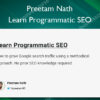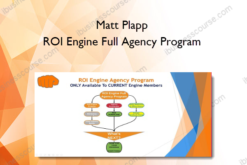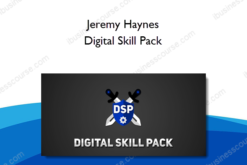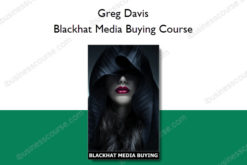Mini MBA in Marketing – Mark Ritson
$2,066.00 $137.00
Total Sold: 8
Description
Mini MBA in Marketing Information
Become the best marketer you can be.
The Mini MBA in Marketing is an MBA level, CPD accredited course that gives you the tools and expertise to supercharge your career. On-demand modules based on Mark Ritson’s award winning MBA teaching form the basis for applied, world class learning.
Designed for marketers of all backgrounds, nationalities and educational levels, over 90% of our alumni complete the course feeling more inspired, confident and effective as a result of taking the Mini MBA in Marketing.
Here’s what you’ll get:
Module 1: Market Orientation
customer focus / business culture / predictive marketing
Getting your head on straight before we even begin is fundamentally important. Start to think from the vantage point of the customer first and not the products, communications, and sales (that come further down the line).
It sounds simple. It’s not. Many well-known companies have failed this first step. Get it right and you throw open the door into the wide world of marketing and start your marketing journey.
Module 2: Market Research
research design / qualitative methods / quantitative methods / backwards market research
If Market Orientation is about digging deeper into your customer needs, Market Research is about filling the hole with insights and lessons from the market.
It’s about choosing the right research methodologies and combining them together to get a full picture of who your customer really is, what they want and how they behave.
Module 3: Segmentation
market mapping /demographics / firmographics / behavioural
All of your customers are different. This poses an important question. Do you treat the whole market the same or try and give individual customers exactly what they want?
Truth is, only selecting one won’t set the marketing world alight.
Learn how to pattern the market based on our insights from Module 2 and define the distinct groups you do, and equally crucial, do not want to target.
Module 4: Targeting
strategic decisions / mass marketing / target segment portraits / targeting criteria
At this stage, it’s time to get the cross hairs out for Targeting as our first advance into strategy.
Choosing who do we target and, crucially, who do we not target is the first fundamental of strategy. It will determine yours and your business’ success.
Module 5: Positioning
brand position / articulation / disruptive execution / perceptual maps
This is where we define what our business stands for, what we want it to represent, and what we want it to be for our target segment(s).
We need to think about three things; what do they want, what can we offer, and who and what are our competitors offering. This will help us find the correct position for our products to be successful.
Module 6: Objectives
Purchase funnel / The right objectives / Strategic decision making
What are our objectives, top-of-funnel, bottom-of-funnel, awareness, preference, repeat purchase?
What are the levers we are going to pull for growth and how do we know what success looks like? This is a crucial decision making moment for marketing success and a central piece of your strategy.
Module 7: Product
product creation /product assessment / NPS scores
Now we have defined and understood everything about our strategy we need to make sure that the product we are selling fits into it perfectly.
So, how do we listen to the customer and design, develop or augment our products so they exactly fulfil the promises we have made to the market?
Module 8: Price
Price settings / Using quantitative models to set a price / Discounting and price wars
There are few more important concepts than pricing. Yet it is also staggering how many so-called marketers neglect it.
We can all sell, but doing so at a level that achieves a sustainable profit is an entirely different matter. Learn how price should be calculated, set and then communicated. Understanding the power of price is one of the key lessons of marketing.
Module 9: Integrated Marketing Communications
The S curve / Profitability matrix / Price setting / Elasticity
After all the work done and positioning ourselves for success, it’s time to think about tactics.
How do we communicate about our product or service to the marketplace? What combination of traditional or digital channels will help us create that most important of things, a successful marketing campaign.
Module 10: Distribution
Omnichannel / Direct vs indirect channel models / D2C sector
Place, the final “P”. How do we get our product from the factory to the customer out in the market?
Understanding the advantages and disadvantages of direct and indirect distribution and their link to the wider business strategy is crucial to business success.
About Author
 Mark Ritson, a leading figure in the world of marketing
Mark Ritson, a leading figure in the world of marketing
Having spent over 25 years teaching marketing to MBA students and being a global brand consultant for over 20 brands, Mark sure knows what he’s talking about.
Mark has taught at Melbourne Business School as an Adjunct Professor of Marketing and has recently decided to work full time on the Mini MBA courses. He has a PhD in Marketing from Lancaster University and has been a marketing professor at London Business School, MIT Sloan (visiting), and the University of Minnesota. He has been the recipient of MBA teaching awards at LBS, MIT, Singapore Management University and MBS.
He has worked globally as a private marketing consultant for clients that have included Baxter, Loewe, McKinsey, Dom Perignon, Subaru, Donna Karan, WD-40, Fresh, De Beers Group, Sephora, Benefit, Ericsson, Jurlique, Amgen, William Hill, Hennessy, News Corp, and Veuve Clicquot. For thirteen years – from 2002 to 2015 – he served as in-house professor for LVMH – the world’s largest luxury group – working in Europe with senior executives from brands like Louis Vuitton, Dom Perignon and Hennessy.
He has written a weekly column for Marketing Week for over a decade. On 3 occasions he has been judged the Business Columnist of the Year at the PPA Press Awards, the highest award for magazine journalism in the UK and was the British Society of Magazine Editors Business Columnist of the Year in 2018. He is also a columnist for The Australian newspaper. His more scholarly publications include articles in the Sloan Management Review, Harvard Business Review, the Journal of Advertising, and the Journal of Consumer Research. He was also the recipient of the Ferber Award for his doctoral thesis.
In 2018 he was rated one of the “Power 50” most important people in media by AdNews, one of ten top business thinkers in Australia by SmartCompany, recognised by the AMI with the Sir Charles McGarth Award, the highest honour for marketing in Australia.
His co-authored research on pricing was cited by George Akerlof during his Nobel Prize acceptance speech.
More courses from the same author: Mark Ritson
Salepage: Mini MBA in Marketing – Mark Ritson
Proof:

Delivery Policy
When will I receive my course?
You will receive a link to download your course immediately or within 1 to 21 days. It depends on the product you buy, so please read the short description of the product carefully before making a purchase.
How is my course delivered?
We share courses through Google Drive, so once your order is complete, you'll receive an invitation to view the course in your email.
To avoid any delay in delivery, please provide a Google mail and enter your email address correctly in the Checkout Page.
In case you submit a wrong email address, please contact us to resend the course to the correct email.
How do I check status of my order?
Please log in to iBusinessCourse account then go to Order Page. You will find all your orders includes number, date, status and total price.
If the status is Processing: Your course is being uploaded. Please be patient and wait for us to complete your order. If your order has multiple courses and one of them has not been updated with the download link, the status of the order is also Processing.
If the status is Completed: Your course is ready for immediate download. Click "VIEW" to view details and download the course.
Where can I find my course?
Once your order is complete, a link to download the course will automatically be sent to your email.
You can also get the download link by logging into your iBusinessCourse account then going to Downloads Page.












